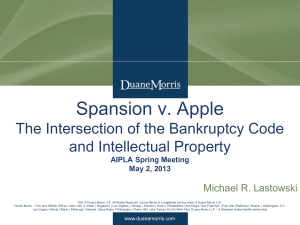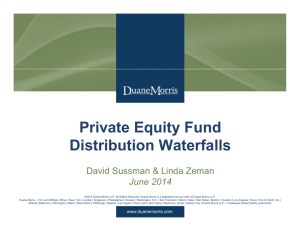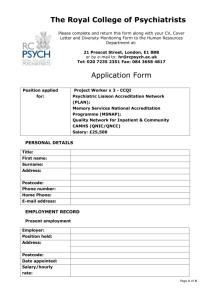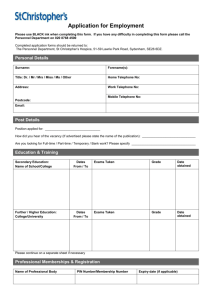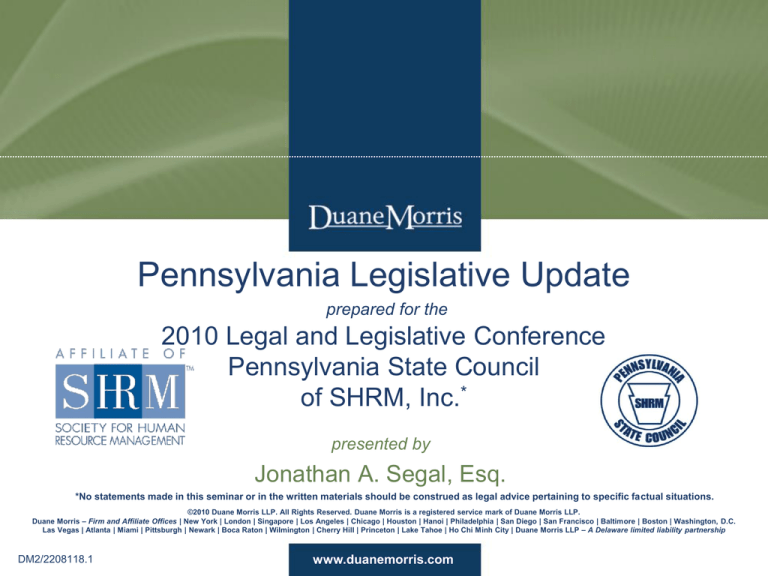
Pennsylvania Legislative Update
prepared for the
2010 Legal and Legislative Conference
Pennsylvania State Council
of SHRM, Inc.*
presented by
Jonathan A. Segal, Esq.
*No statements made in this seminar or in the written materials should be construed as legal advice pertaining to specific factual situations.
©2010 Duane Morris LLP. All Rights Reserved. Duane Morris is a registered service mark of Duane Morris LLP.
Duane Morris – Firm and Affiliate Offices | New York | London | Singapore | Los Angeles | Chicago | Houston | Hanoi | Philadelphia | San Diego | San Francisco | Baltimore | Boston | Washington, D.C.
Las Vegas | Atlanta | Miami | Pittsburgh | Newark | Boca Raton | Wilmington | Cherry Hill | Princeton | Lake Tahoe | Ho Chi Minh City | Duane Morris LLP – A Delaware limited liability partnership
DM2/2208118.1
www.duanemorris.com
I. PROPOSED
PENNSYLVANIA BILLS
www.duanemorris.com
1
SENATE BILL
NO. 1080
PENNSYLVANIA HUMAN
RELATIONS ACT
www.duanemorris.com
2
Pennsylvania Human Relations Act
Section 1. Section 4(b) of ….Pennsylvania
Human Relations Act….is amended to
read:
www.duanemorris.com
3
Pennsylvania Human Relations Act
Section 4. (b) The term “employer” includes the
Commonwealth or any political
subdivision or board, department,
commission or school district thereof
and any person employing [four] one
or more persons within the
Commonwealth, but
www.duanemorris.com
4
HOUSE BILL NO. 300
PENNSYLVANIA HUMAN
RELATIONS ACT
www.duanemorris.com
5
Pennsylvania Human Relations Act
Section 4. Definitions. – As used in this act unless a
different meaning clearly appears from
the context:
(bb) The term “sexual orientation” means whether
actual or perceived heterosexuality,
homosexuality or bisexuality.
(cc) The term “gender identity or expression” means
actual or perceived gender identity, appearance,
behavior, expression or physical characteristics
whether or not associated with an individual’s
assigned sex at birth.
www.duanemorris.com
6
HOUSE BILL NO. 164
PENNSYLVANIA HUMAN
RELATIONS ACT
www.duanemorris.com
7
Pennsylvania Human Relations Act
Section 4. Definitions. – As used in this act unless a
different meaning clearly appears from
the context:
(bb) The term “breastfeeds” means the feeding of a
child with breast milk directly from the breast.
www.duanemorris.com
8
HOUSE BILL NO. 1561
MINIMUM WAGE ACT
www.duanemorris.com
9
Minimum Wage Act
Section 4. Minimum wages. – Except as may
otherwise be provided under this act:
(9)
Beginning January 1, 2010, and each succeeding January
1 thereafter, the minimum wage shall be increased by an
annual cost-of-living adjustment calculated by applying the
percentage change in the Consumer Price Index for all
Urban Consumers (CPI-U) for the Pennsylvania, New
Jersey, Delaware and Maryland area, for the most recent
twelve month-period for which figures have been officially
reported by the United States Department of Labor,
Bureau of Labor Statistics sixty days prior to the date the
adjustment is due to take effect, to the then current salary
amounts.
www.duanemorris.com
10
HOUSE BILL NO. 1830
HEALTHY FAMILIES, HEALTHY
WORKPLACES ACT
www.duanemorris.com
11
Healthy Families, Healthy Workplaces Act
Section 4. Accrual of paid sick leave.
(a) General rule. – Except as provided for in
subsection (b), employers shall provide a
minimum of one hour of paid sick leave for
every 40 hours worked by an employee.
Employers are not required to provide more
than 52 hours of sick leave for an employee
in a calendar year.
www.duanemorris.com
12
Healthy Families, Healthy Workplaces Act
Section 4. Accrual of paid sick leave.
(b) Exception. – Employers that employ fewer
than ten individuals shall provide a minimum
of one hour of paid sick leave for every 80
hours worked by an employee. Employers
under this subsection are not required to
provide more than 26 hours of paid sick
leave in a calendar year.
www.duanemorris.com
13
Healthy Families, Healthy Workplaces Act
Section 5. Use of paid sick leave.
(a) General rule. – Paid sick leave shall be
provided to an employee by an employer or
small employer for:
(1) An employee’s mental or physical illness, injury
or health condition or need for medical
diagnosis, care or treatment of a mental or
physical illness, injury or health condition or
need for preventive medical care.
www.duanemorris.com
14
Healthy Families, Healthy Workplaces Act
Section 5. Use of paid sick leave.
(a) General rule. – Paid sick leave shall be
provided to an employee by an employer or
small employer for: (continued)
(2) Care of a spouse, child, parent, grandparent
or extended family member, or any other
individual related by blood or affinity whose
close relationship with the employee is the
equivalent of a family relationship, with a
mental or physical illness….
www.duanemorris.com
15
Healthy Families, Healthy Workplaces Act
Section 5. Use of paid sick leave.
(a)
General rule. – Paid sick leave shall be provided to an
employee by an employer or small employer for: (continued)
(3) Absence necessary due to domestic violence, provided
the leave is to:
(i)
(ii)
(iii)
(iv)
(v)
Seek medical attention for the employee or employee’s child,
spouse, parent, grandparent or extended family member ….
Obtain services from a victims’ services organization.
Obtain psychological or other counseling.
Seek relocation due to the domestic or sexual violence or
stalking.
Take legal action….related to or resulting from the domestic or
sexual violence.
www.duanemorris.com
16
Healthy Families, Healthy Workplaces Act
Section 9. Enforcement.
(e) Class action. – Actions brought under this
section may be brought as a class action
pursuant to the laws of this Commonwealth.
www.duanemorris.com
17
Healthy Families, Healthy Workplaces Act
Section 10. Confidentiality and nondisclosure.
If an employer possesses health information or
information pertaining to domestic violence
about an employee or employee’s child, parent,
spouse, extended family member or other
individual described in section 5, the information
shall be treated as confidential and not
disclosed except pursuant to the Health
Insurance Portability and Accountability Act of
1996.
www.duanemorris.com
18
HOUSE BILL NO. 2045
WAGE PAYMENT
AND COLLECTION LAW
www.duanemorris.com
19
Wage Payment and Collection Law
Section 1.
Sections 10 and 11.1….of the Wage Payment
and Collection Law….are amended to read:
www.duanemorris.com
20
Wage Payment and Collection Law
Section 10. Liquidated Damages.
Where wages remain unpaid for thirty days
beyond the regularly scheduled payday....the
employee shall be entitled to claim, in addition,
as liquidated damages an amount equal to
[twenty-five percent (25%)] three hundred
percent (300%) of the total amount of wages
due, or five hundred dollars [$500], whichever
is greater.
www.duanemorris.com
21
Wage Payment and Collection Law
Section 11.1. Criminal Penalties.
(b) In addition to any other penalty or punishment
otherwise prescribed by law, any employer who
violates any provisions of this act shall be guilty
of a [summary offense] misdemeanor and, upon
conviction thereof, shall be punished by a fine of
not more than [three hundred dollars ($300)]
two thousand, five hundred dollars ($2,500), or
by imprisonment up to 90 days, or by both, for
each offense.
www.duanemorris.com
22
II. PHRC PROPOSED
GUIDANCE ON CRIMINAL
CONVICTIONS
www.duanemorris.com
23
PHRC Proposed Guidance on Criminal
Convictions
1. Premise
a. African Americans and Hispanics have
criminal convictions at a rate disproportionate
to their representation in the Commonwealth
of Pennsylvania
b. Employers often exclude from consideration
applicants with convictions so that certain
minorities are disproportionately excluded
www.duanemorris.com
24
PHRC Proposed Guidance on Criminal
Convictions
2. Presumption
a. Presumption of disparate impact if employer
excludes applicant based on conviction if
applicant is African American or Hispanic
b. No need to show disparate impact in decisionmaking by employer
c. Societal adverse impact attributable to each
employer
www.duanemorris.com
25
PHRC Proposed Guidance on Criminal
Convictions
3. Overcoming the Presumption
a. Statistical defense: utilize conviction data from a
more limited geographical boundary than the
entire Commonwealth of Pennsylvania
b. Business necessity defense: must demonstrate
“unacceptable level of risk”
www.duanemorris.com
26
PHRC Proposed Guidance on Criminal
Convictions
4.
Factors in Determining “Unacceptable Level of
Risk”
a. Circumstances, number and seriousness of the prior
offense(s)
b. Whether each conviction substantially relates to
applicant’s suitability for the job
c. Length of time that has elapsed subsequent to conviction
or release from prison—presumption against business
necessity if 7 years or more since offense and no new
offense
d. Evidence of rehabilitation (employment history,
education, drug or alcohol treatment, etc.)
www.duanemorris.com
27
PHRC Proposed Guidance on Criminal
Convictions
5. Less Discriminatory Measures
a. Even if employer can demonstrate business
necessity, applicant still prevail if can show less
discriminatory alternative
b. At a very minimum, litigation issue
www.duanemorris.com
28
PHRC Proposed Guidance on Criminal
Convictions
6. Problems
a. Constitutional: mandating differential treatment of
applicants based on race or national origin
www.duanemorris.com
29
PHRC Proposed Guidance on Criminal
Convictions
6. Problems (continued)
b. Inconsistent with case law:
i.
To bring disparate impact claim, plaintiff must
demonstrate the employer’s policy or practice has
disparate impact. El v. Septa, 479 F.2d 232 (3d Cir
2007)
ii. To prove employer’s policy or practice has disparate
impact, statistical evidence is not enough. Plaintiff must
prove a “strong basis in evidence.” Ricci v. DeStephano
128 S.Ct. 2658 (2009)
www.duanemorris.com
30
PHRC Proposed Guidance on Criminal
Convictions
6. Problems (continued)
c. Unnecessary because of existing:
i. Title VII protections
ii. PHRA protections
www.duanemorris.com
31
PHRC Proposed Guidance on Criminal
Convictions
6. Problems (continued)
d. Inconsistent with PA statute on criminal
conviction
i.
PA law on criminal convictions—convictions (and not
arrests), suitability for job, written notice to
applicant—18 PA. C.S. 919 et seq.
ii. De facto new protected group—minorities with
conviction (only legislature can create new protected
groups)
www.duanemorris.com
32
PHRC Proposed Guidance on Criminal
Convictions
6. Problems (continued)
e. Exposes employers to other risks
i.
Presumption against business necessity if applicant
has not re-offended in 7 year or more—negligent hire
risk
ii. Inquiry into drug or alcohol rehabilitation status—ADA
risk
www.duanemorris.com
33
PHRC Proposed Guidance on Criminal
Convictions
6. Problems (continued)
f. Illogical—analogies
i.
Long hours and women with children—presumption of
disparate impact based on sex if long hours?
ii. Saturdays and Orthodox Jews—presumption of
disparate impact based on religion if require Saturday
work?
www.duanemorris.com
34
PHRC Proposed Guidance on Criminal
Convictions
7. Impact of Proposal
a. Public awareness of issue
b. Anticipate increase in claims
c. Look carefully at factors recommended by
PHRC (except presumptions and timing of
inquiry)
www.duanemorris.com
35
PHRC Proposed Guidance on Criminal
Convictions
7. Impact of Proposal (continued)
d. Document basis for rejection of applicant with
conviction
i. Disparate treatment claim under federal or state
law—unconscious bias real risk here
ii. Disparate impact claim under federal or state law
iii. Suitability for employment claim—PA criminal
conviction statute
www.duanemorris.com
36
III. BILLS FROM
OTHER JURISDICTIONS
www.duanemorris.com
37
CALIFORNIA
ASSEMBLY BILL NO. 943
CREDIT REPORTS
www.duanemorris.com
38
Credit Reports
1024.5. (a) An employer shall not use a
consumer credit report for employment purposes
unless the following criteria are satisfied:
(1) The information contained in the report is
substantially job-related, meaning that the
position of the person for whom the report is
sought has access to money, other assets, or
confidential information.
www.duanemorris.com
39
Credit Reports
1024.5. (a) An employer shall not use a
consumer credit report for employment purposes
unless the following criteria are satisfied: (continued)
(2) The position of the person for whom the report
is sought is any of the following:
(A) A managerial position.
(B) A position in the state Department of Justice.
(C) A position in a city, county, or both city and
county.
www.duanemorris.com
40
Credit Reports
1024.5. (a) An employer shall not use a
consumer credit report for employment purposes
unless the following criteria are satisfied:
(2) The position of the person for whom the report
is sought is any of the following: (continued)
(D) That of a sworn peace officer or other law
enforcement position.
(E) A position for which the information contained in
the report is required to be disclosed by law or to
be obtained by the employer.
www.duanemorris.com
41
ALABAMA
SENATE BILL NO. 360
FIREARMS IN THE WORKPLACE
www.duanemorris.com
42
Firearms in the Workplace
Section 2(a): A business entity, property owner, tenant, or
public or private employer may not establish,
maintain, or enforce a policy or rule that
prohibits or has the effect of prohibiting a
person from transporting or storing a firearm or
ammunition when the person is otherwise in
compliance with all other applicable laws and
the firearm or ammunition is locked out of sight
within the trunk, glove box, or other enclosed
compartment or area within or on a privately
owned motor vehicle.
www.duanemorris.com
43
MASSACHUSETTS
SENATE NO. 699
WORKPLACE BULLYING
www.duanemorris.com
44
Workplace Bullying
Section 1 – Preamble
(a) Findings
(3) Workplace bullying, mobbing, and harassment
can inflict serious harm upon targeted
employees, including feelings of shame and
humiliation, severe anxiety, depression,
suicidal tendencies, impaired immune systems,
hypertension, increased risk of cardiovascular
disease, and symptoms consistent with posttraumatic stress disorder.
www.duanemorris.com
45
Workplace Bullying
Section 1. Preamble
(a) Findings (continued)
(6) Legal protection from abusive work
environments should not be limited to behavior
grounded in protected class status as that
provided for under employment discrimination
statutes; and,
www.duanemorris.com
46
Workplace Bullying
Section 2. Definitions
(1)
Abusive conduct. Abusive conduct is conduct, including acts,
omissions, or both, that a reasonable person would find
hostile, based on the severity, nature, and frequency of the
defendant’s conduct. Abusive conduct may include, but is
not limited to: repeated infliction of verbal abuse such as the
use of derogatory remarks, insults, and epithets; verbal or
physical conduct of a threatening, intimidating, or humiliating
nature; the sabotage or undermining of an employee’s work
performance; or attempts to exploit an employee’s known
psychological or physical vulnerability. A single act normally
will not constitute abusive conduct, but an especially severe
and egregious act may meet this standard.
www.duanemorris.com
47
Workplace Bullying
Section 3. Unlawful Employment Practices
(a) Abusive Work Environment. It shall be an
unlawful employment practice under this
Chapter to subject an employee to an
abusive work environment as defined by this
Chapter.
www.duanemorris.com
48
IV. WHAT WERE THEY
THINKING?
www.duanemorris.com
49
Los Angeles
Toads may not be licked.
www.duanemorris.com
50
New York
New Yorkers cannot dissolve a marriage for
irreconcilable differences, unless they both agree
to it.
www.duanemorris.com
51
Alabama
It is illegal for a driver to be blindfolded while
operating a vehicle.
www.duanemorris.com
52
Texas
When two trains meet each other at a railroad
crossing, each shall come to a full stop, and
neither shall proceed until the other has gone.
www.duanemorris.com
53
Florida
Having sexual relations with a porcupine is
illegal.
www.duanemorris.com
54
V. LEGISLATIVE
BACKGROUND
www.duanemorris.com
55
Background
1.
Standard legislative process in Pennsylvania
a.
b.
c.
d.
e.
f.
g.
Sponsor introduces the legislation
Vote by Committee
Amendments and final vote on floor of chamber
Passage by first chamber
Passage by other chamber
Reconciliation (if differences in bills or versions)
Action by governor
i.
ii.
Sign into law
Veto legislation and send back to General Assembly
www.duanemorris.com
56
Background
2. Current political landscape
a. Governor (until Jan. 2011) – Democrat
i. 2010 campaign for Governor very competitive
ii. Past history—change of party likely
b. House – Democratic majority (104 – 98)
c. Senate – Republican majority (30 – 20)
www.duanemorris.com
57
Background
3. Remember:
a. As former U.S. House Speaker Tip O’Neill
advised: “All politics is local”
b. However, one cannot ignore impact of national
politics on local politics; local reps may want to:
i. Fill a perceived gap (political or policy)
ii. Wait to see how national government deals with
issue
iii. Follow national (or other states) trends
www.duanemorris.com
58
VI. WHAT TO DO?
www.duanemorris.com
59
What to do?
1. Follow legislation
a. Track individual bills
b. Look for political and policy trends in PA
c. Be mindful of developments in other jurisdictions
www.duanemorris.com
60
What to do?
2. Evaluate bills--think critically
a. Consider short-term and long-term impact
b. Focus on the interests not only of employers but
also employees — unintended but foreseeable
adverse consequences of legislative action
with laudable motivation
www.duanemorris.com
61
What to do?
3. Know your Senators and Representatives
a. Visit them in the Capitol
b. Invite them to meet with you and others
c. Develop relationships with their staffers too (too
many people ignore this)
www.duanemorris.com
62
What to do?
4. Build positive relationships
a. Don’t make assumptions based on partisan
affiliation
b. Don’t burn bridges – coalitions change
frequently in the legislative arena
c. Make public policy a two-way street – let elected
officials know you want to develop a mutuallybeneficial, symbiotic relationship by offering
yourself, and your company, as a valuable
resource for knowledge in your field
www.duanemorris.com
63
What to do?
5. Get others involved
a. Internal (e.g., CEO)
b. External (e.g., trade association)
c. Consider hiring your own lobbyist (to focus
solely on your company’s concerns, particularly
if unique)
www.duanemorris.com
64
What to do?
6. Contact me*, please, if you:
a. Have concerns about specific bill
b. Hear about “non-employment” bill with
employment implications
c. Become aware of any public hearing
d. Become aware of any “compromises” other
“advocacy” groups are considering
* jsegal@duanemorris.com or
(215) 979-1869
www.duanemorris.com
65
What to do?
7. Communicate your position to your Senator
and Representative
a.
b.
c.
d.
e.
f.
Consider the impact on her/his district
Learn and account for her/his interests
Don’t assume she/he knows the bill or issues
Explain the bill succinctly
Be direct with your position, but don’t intimidate
Give real life examples, if possible
www.duanemorris.com
66
What to do?
7. Communicate your position to your Sen/Rep
(continued)
e. Know the arguments on the other side and be
prepared to respond to them
f. Give to her/him positive reasons and a
“defense” to vote for your position
g. Do not attack motives of bill’s proponents
h. Be honest — credibility is critical
i. Do not lose your temper
www.duanemorris.com
67
What to do?
8. Follow-up
a. Monitor results
b. Thank those who support you
c. Communicate respectfully with those who don’t
www.duanemorris.com
68
What to do?
9. Keep in mind the importance of timing
a.
b.
c.
d.
Developing relationships
Communicating position
Reaching out to others
Following-up
www.duanemorris.com
69
What to do?
10. Final points
a. Legal considerations: discoverability of
communications
b. Personal considerations: check with your
employer before taking public position
c. HR considerations: assume your workforce will
find out what you say and make sure what you
have said is defensible in terms of content and
tone
www.duanemorris.com
70
Thank You!
©2010 Duane Morris LLP. All Rights Reserved. Duane Morris is a registered service mark of Duane Morris LLP.
Duane Morris – Firm and Affiliate Offices | New York | London | Singapore | Los Angeles | Chicago | Houston | Hanoi | Philadelphia | San Diego | San Francisco | Baltimore | Boston | Washington, D.C.
Las Vegas | Atlanta | Miami | Pittsburgh | Newark | Boca Raton | Wilmington | Cherry Hill | Princeton | Lake Tahoe | Ho Chi Minh City | Duane Morris LLP – A Delaware limited liability partnership
www.duanemorris.com

